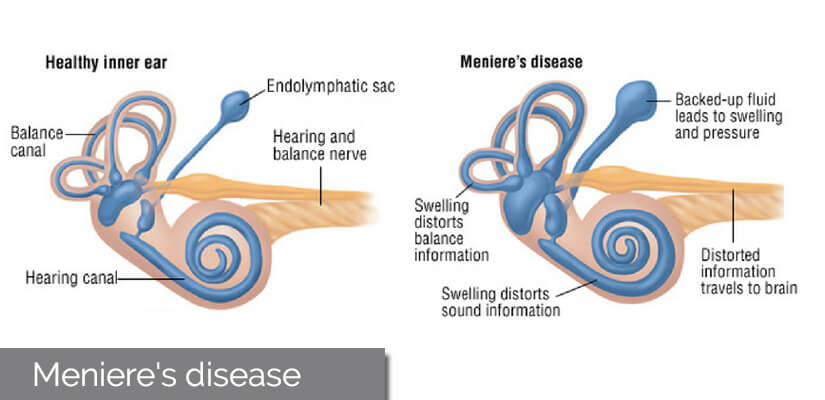
Just imagine the situation when you wake up in the morning, open your eyes and as you move your head, you start seeing your room moving or spinning around you. The Vertigo May Be Menieres Disease Or BPPV.
When you get out of bed, you have to take help of things like furniture and walls to hold on so that you can make at least a few steps.
Now assume that you didn’t drink so much the night before. One of the most feasible explanations for this worst experience is that you are a vertigo sufferer.
You can purchase the latest hearing aids at a fair price through HearingSol, If you need any assistance or you have a query regarding Vertigo or Meniere’s Disease & Hearing Loss, feel free to call us at +91-9327901950. We are always here to help you.
It becomes frightening and uncomfortable when the sensation is especially accompanied by dizziness and nausea causing headaches too.
Vertigo is commonly a symptom of another concealed medical issue. There are many unique conditions linked to vertigo. Generally, it is caused either by the inner ear problems which are known as peripheral vertigo.
It may be also caused due to the problems in the brain or nervous system which are known as central vertigo. Not only this but also certain risk factors and other medical issues are capable of leading episodes of vertigo.
What Is Vertigo?
Vertigo is a physical feeling of spinning dizziness. It is commonly affiliated with looking down from a great height. But it can also refer to a condition of temporary or ongoing dizzy spells that are caused by an inner ear or brain problems. Any condition can cause vertigo dizziness.
We can’t say that Vertigo is simply a general feeling of faintness. But it’s a rotational dizziness.
Vertigo Signs And Symptoms
A person suffering from vertigo dizziness will feel like that their head, or their surrounding environment, is spinning rapidly. Vertigo can further indicate a symptom of other conditions.
These are:
- balance problems
- light-headed and dizzy
- a sense of motion sickness
- nausea and vomiting
- tinnitus
- a feeling of fullness in the ear
- a headache
What Causes Vertigo?
Reasons for vertigo are given in detail:
- Benign Paroxysmal Positional Vertigo (BPPV): Vertigo is commonly caused by BPPV. It happens when ear crystals break free and float inside the inner ear tubes known as semicircular canals. BPPV vertigo usually ends up in short episodes of vertigo that come on instantly and last from sec to min. Some head movements also trigger vertigo in people with BPPV. Most of the time, doctors can’t recognize the exact BPPV causes. But it’s sometimes linked with a minor or severe blow to the head.
- Labyrinthitis: This condition is referred to as “vestibular neuritis”, and is characterized by itchy and swelled inner ear. Normally it is due to an inner ear infection or virus. Sudden vertigo symptoms and hearing loss issues are common in labyrinthitis patients.
- Meniere’s disease: It is caused when an excess amount of fluid buildup in your inner ear. People with this disease often face sudden episodes of vertigo lasting for a long time. They may show symptoms like ringing in the ears, hearing loss, etc. Doctors aren’t sure about the exact causes of Meniere’s syndrome. But they know that it’s linked to inner ear viral infections, allergies, and head injuries. Hereditary factors somewhat also play a major role.
Other Causes
Migraine headaches are also responsible for vertigo. There are a quarter of people with migraines who experience vertigo. Vertigo is considered as a side effect of many medicines.
Less common causes include:
- stroke or mini-stroke (transient ischaemic attack)
- a benign tumor of the nerve that connects the inner ear to the brain
- Multiple Sclerosis (MS)
- a tumor in the part of the brain called the cerebellum
- middle ear infection
Types Of Vertigo
Two different types of vertigo are explained below depending on the cause:
- Peripheral vertigo: This occurs due to the disturbance in the balance organs of your inner ear.
- Central vertigo: It is a result of a disturbance in single or more than one part of the brain.
1. Peripheral Vertigo
This type is mainly linked to the inner ear. The tiny organs of the labyrinth of the inner ear enable messages to send to the brain in order to give the response to gravity. This is to inform the brain when there is a vertical position movement.
It enables people to maintain their balance when they stand up. Disruption towards this system produces vertigo. It is because of an inflammation source, usually due to a viral infection.
2. Central Vertigo
Central vertigo is associated with the problems of the central nervous system. Disturbance takes place in the following areas:
- the brainstem
- the cerebellum
These brain parts deal with the interrelation between the person’s perception of vision and balance.
Vertigo Treatment
We all know that an accurate assessment of hearing loss is required in diagnosing Meniere’s syndrome. Several tests are normally performed. According to NIDCD, these procedures and tests are useful in determining that a tumor responsible for causing the hearing loss and balance disorder.
Doctors use various types of hearing tests to know whether hearing loss is sensory implying arising from the inner ear, or neural that shows it derives from the hearing nerve.
Physicians record the auditory brainstem response to measure the electrical activity in the hearing nerve and brain stem.
Electrocochleography is the test used to record the electrical activity of the inner ear in response to sound. It is also used to confirm the presence of Meniere’s disease.
In order to test the vestibular system, doctors use caloric testing. It has nothing to do with your calorie intake. In this procedure, the physician will flush your ears with warm and cool water or maybe air also.
The resulting rapid eye movements can help a physician to analyze and observe a balance disorder.
One option includes balance retraining exercises where movements of the head and body specifically developed for each individual patient.
These programs are regulated by professionals who did proper training and knowledge regarding the vestibular system and other systems interacted with it.
Tests
Here are certain tests recommended by your doctor, including:
- Formal hearing tests
- Balance tests
- Magnetic resonance imaging (MRI) of your brain
Self-care
Depending on the true cause behind your vertigo, there are certain things you can do yourself for vertigo relief. Your vertigo doctor may advise you to:
- do some vertigo treatment exercises to correct your symptoms
- try to sleep by raising your head slightly on at least two pillows
- get up calmly and slowly when you are getting out of bed
- sit on the bed edge for a minute or so before standing
- when you pick up items, try to avoid bending down to hold them
- avoid extending or stretching your neck so much
- always move your head carefully while during daily activities
Vertigo Home Remedies
You can manage vertigo naturally with a variety of home remedies:
- Epley maneuver
- Ginkgo biloba
- Ginger tea
- Almonds
- Staying hydrated
- Apple cider vinegar and honey
- Essential oils
- Acupressure
How To Know That Your Vertigo May Be Menieres Disease?
Meniere’s disease is an inner ear disorder caused by a fluid build-up and changing pressure in the ear. It can cause vertigo along with tinnitus and hearing loss.
What Is Meniere’s Disease?
Meniere’s disease is a disorder affecting the inner ear. The inner ear supports hearing and balance. The condition causes the sensation of spinning.
Along with the hearing problems and a ringing sound in the ear, it can affect only one ear.

Meniere’s disease is a chronic disorder. But Meniere’s disease treatment can help to overcome and ease symptoms. Many people diagnosed with this problem will go into remission within a few years after their diagnosis.
When Doctors Can’t Find the Cause for Vertigo?
It happens sometimes that doctors fail to identify a specific source for vertigo symptoms. For example, usually, there is no known BPPV trigger.
Your vertigo symptoms can be annoying while not knowing what are vertigo triggers. But it doesn’t imply that you can’t get proper vertigo medications and treatment.
Your healthcare provider will give you the best treatment to control your vertigo episodes no matter whether the exact cause is identified or not.
You can purchase the latest hearing aids at a fair price through HearingSol, If you need any assistance or you have a query regarding Vertigo or Meniere’s Disease & Hearing Loss, feel free to call us at +91-9327901950. We are always here to help you.

 Reviewed by Mr. Ranjeet Kumar
Sr. Audiologist, Speech Therapist & Cochlear Implant Specialist, BASLP on
Reviewed by Mr. Ranjeet Kumar
Sr. Audiologist, Speech Therapist & Cochlear Implant Specialist, BASLP on